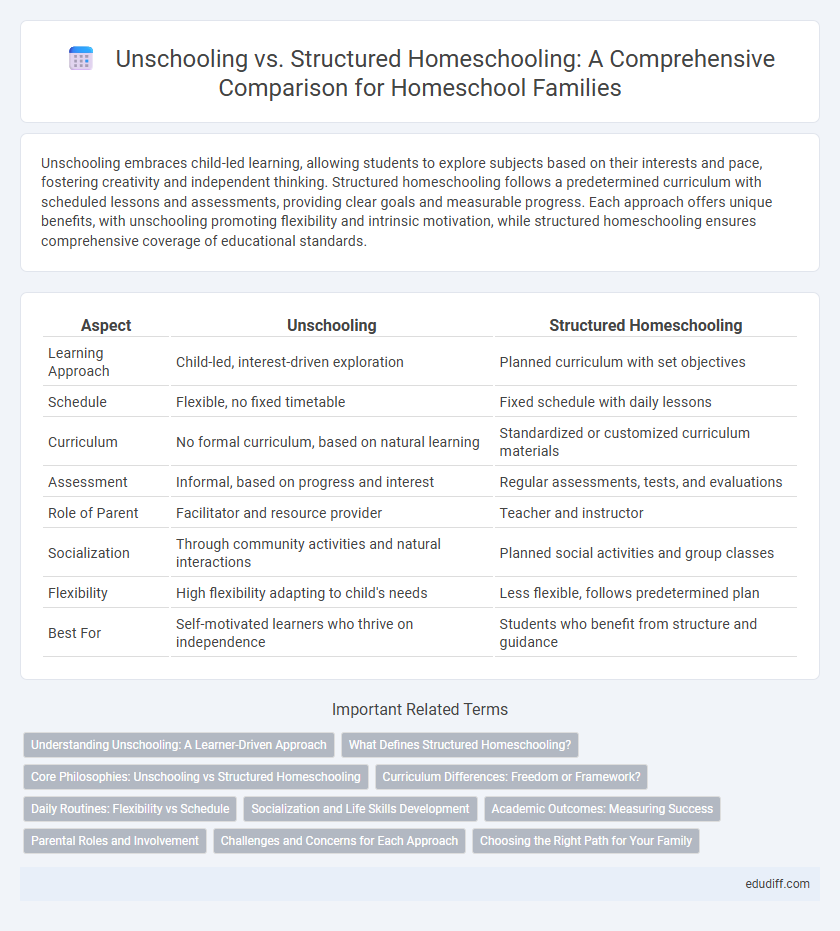Unschooling embraces child-led learning, allowing students to explore subjects based on their interests and pace, fostering creativity and independent thinking. Structured homeschooling follows a predetermined curriculum with scheduled lessons and assessments, providing clear goals and measurable progress. Each approach offers unique benefits, with unschooling promoting flexibility and intrinsic motivation, while structured homeschooling ensures comprehensive coverage of educational standards.
Table of Comparison
| Aspect | Unschooling | Structured Homeschooling |
|---|---|---|
| Learning Approach | Child-led, interest-driven exploration | Planned curriculum with set objectives |
| Schedule | Flexible, no fixed timetable | Fixed schedule with daily lessons |
| Curriculum | No formal curriculum, based on natural learning | Standardized or customized curriculum materials |
| Assessment | Informal, based on progress and interest | Regular assessments, tests, and evaluations |
| Role of Parent | Facilitator and resource provider | Teacher and instructor |
| Socialization | Through community activities and natural interactions | Planned social activities and group classes |
| Flexibility | High flexibility adapting to child's needs | Less flexible, follows predetermined plan |
| Best For | Self-motivated learners who thrive on independence | Students who benefit from structure and guidance |
Understanding Unschooling: A Learner-Driven Approach
Unschooling emphasizes learner-driven education, allowing children to explore interests at their own pace without a fixed curriculum. This approach encourages natural curiosity and self-motivation, promoting critical thinking and creativity through real-world experiences. Unlike structured homeschooling, unschooling adapts flexible schedules and personalized learning paths tailored to individual strengths and passions.
What Defines Structured Homeschooling?
Structured homeschooling is defined by a well-planned curriculum, scheduled daily lessons, and clear educational objectives tailored to meet state or national standards. It typically involves formal assessments, graded assignments, and a consistent routine that mirrors traditional school settings. This approach emphasizes accountability, measurable progress, and often includes resources like textbooks, workbooks, and online courses to guide student learning effectively.
Core Philosophies: Unschooling vs Structured Homeschooling
Unschooling centers on child-led learning, emphasizing exploration, creativity, and intrinsic motivation without a fixed curriculum. Structured homeschooling relies on a predefined syllabus, scheduled lessons, and measurable outcomes to ensure academic progress and consistency. Both approaches prioritize personalized education but differ fundamentally in autonomy versus organized guidance.
Curriculum Differences: Freedom or Framework?
Unschooling emphasizes learner-directed exploration without a formal curriculum, allowing children to pursue interests at their own pace and fostering intrinsic motivation. Structured homeschooling follows a predefined curriculum with set goals and timelines, ensuring comprehensive coverage of academic subjects and measurable progress. The choice between freedom or framework depends on a family's educational philosophy and the child's learning style.
Daily Routines: Flexibility vs Schedule
Unschooling emphasizes flexibility in daily routines, allowing children to explore interests organically without strict schedules, fostering creativity and self-motivation. Structured homeschooling follows a set timetable, providing consistency with designated times for subjects, breaks, and activities to ensure comprehensive coverage of curriculum goals. Both approaches accommodate different learning styles, with unschooling prioritizing spontaneity and structured homeschooling emphasizing routine and predictability.
Socialization and Life Skills Development
Unschooling encourages natural socialization through community involvement, peer interactions, and real-world experiences, fostering adaptability and interpersonal skills. Structured homeschooling provides targeted social opportunities via clubs, classes, and organized activities, ensuring deliberate development of social competencies. Both methods cultivate life skills--unschooling through self-directed learning and problem-solving, structured homeschooling through planned curricula emphasizing responsibility and time management.
Academic Outcomes: Measuring Success
Academic outcomes in unschooling vary due to its flexible, learner-driven approach, often making standardized testing less applicable as a success metric. Structured homeschooling typically aligns with curricula and standardized assessments, providing more quantifiable data on student progress and mastery of academic standards. Research shows both methods can achieve strong academic success when tailored to the child's learning style and needs, emphasizing that personalized education strategies impact measurable outcomes more than the educational model itself.
Parental Roles and Involvement
In unschooling, parents act primarily as facilitators, providing resources and guidance based on the child's interests, promoting autonomy and self-directed learning. Structured homeschooling requires parents to take on more active roles as educators, planners, and assessors, ensuring adherence to a set curriculum and learning objectives. Both approaches demand significant parental involvement, but unschooling emphasizes flexibility and responsiveness, while structured homeschooling focuses on consistency and accountability.
Challenges and Concerns for Each Approach
Unschooling faces challenges such as inconsistent academic progress and limited social interaction opportunities, raising concerns about preparedness for standardized testing and future educational pathways. Structured homeschooling often struggles with rigidity, potentially stifling creativity and motivation while demanding significant parental time commitment and expertise. Both approaches require careful balancing of educational goals and individual child needs to optimize learning outcomes and development.
Choosing the Right Path for Your Family
Choosing between unschooling and structured homeschooling depends on your family's learning style, goals, and values. Unschooling promotes child-led exploration and flexibility, fostering creativity and independence, while structured homeschooling emphasizes set curricula and routine for measurable progress and consistency. Evaluating your child's personality and your capacity to provide guidance will help determine the most effective educational approach for your family's unique needs.
Unschooling vs Structured Homeschooling Infographic

 edudiff.com
edudiff.com